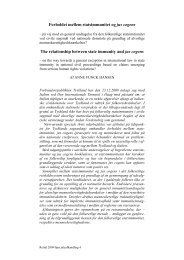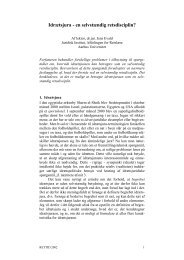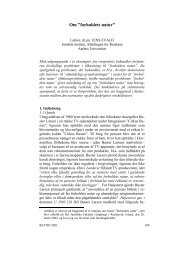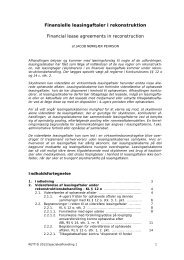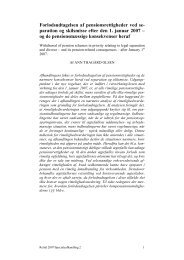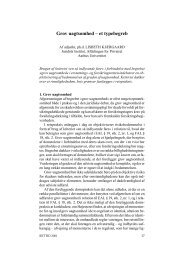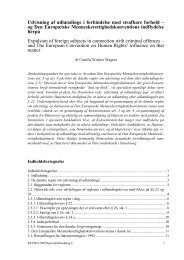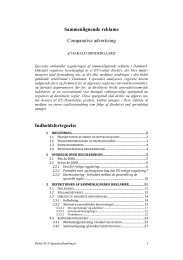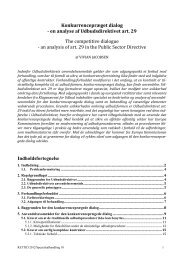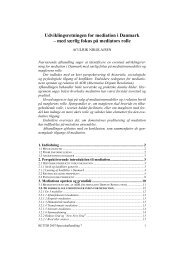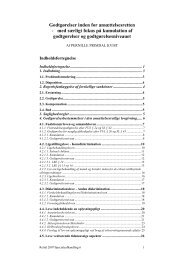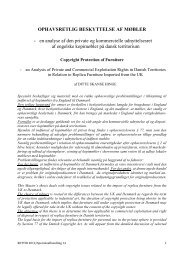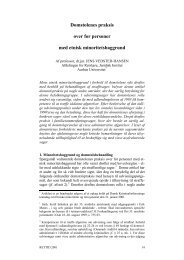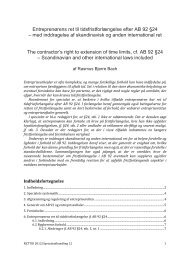Product liability under the CISG and Concurring tort law claims ...
Product liability under the CISG and Concurring tort law claims ...
Product liability under the CISG and Concurring tort law claims ...
Create successful ePaper yourself
Turn your PDF publications into a flip-book with our unique Google optimized e-Paper software.
ecovery of punitive or unforeseeable damages. This could shift <strong>the</strong> balance which has been established<br />
between <strong>the</strong> buyer <strong>and</strong> <strong>the</strong> seller in <strong>the</strong> Convention <strong>and</strong> create loopholes which will effect <strong>the</strong> success of<br />
<strong>the</strong> Convention as an instrument in international trade.<br />
The fact that a uniform solution to <strong>the</strong> issue of concurring <strong>claims</strong> does not exist, is damaging both to <strong>the</strong><br />
Convention itself, since <strong>the</strong> success of <strong>the</strong> Convention is based largely on uniform application, <strong>and</strong> for international<br />
trade in general, because it creates uncertainties, which companies have to take into account<br />
when <strong>the</strong>y enter into a contract for <strong>the</strong> international sale of goods, e.g. by opting out of <strong>the</strong> Convention cf.<br />
art 6 <strong>CISG</strong>.<br />
Whereas contract <strong>law</strong> protects what a party is entitled to expect <strong>under</strong> a contract, <strong>tort</strong> <strong>law</strong> protects a wider<br />
<strong>and</strong> more fundamental range of interests, which exist independently from any contractual relationship. The<br />
general consideration <strong>under</strong>lying domestic product <strong>liability</strong> <strong>law</strong>s is based on <strong>the</strong> notion that buyers should<br />
be compensated, when dangerous or defective goods cause injury or damage to <strong>the</strong>m or <strong>the</strong>ir property.<br />
Regardless of whe<strong>the</strong>r concurring <strong>claims</strong> are allowed or not, it will end up ei<strong>the</strong>r circumventing domestic<br />
product <strong>liability</strong> <strong>law</strong>s or <strong>the</strong> Convention – at least to some extend. Therefore, it is important to look into <strong>the</strong><br />
considerations behind this legislation to get <strong>the</strong> information which is necessary to determine whe<strong>the</strong>r domestic<br />
product <strong>liability</strong> <strong>law</strong>s or <strong>the</strong> Convention should take priority<br />
This <strong>the</strong>sis will evaluate <strong>the</strong> different views on how to deal with concurring <strong>claims</strong> <strong>and</strong> propose a solution.<br />
When analyzing <strong>the</strong> issue in relation to product <strong>liability</strong>, <strong>the</strong> first step is to determine <strong>the</strong> scope of art 5<br />
<strong>CISG</strong> by performing an interpretation of it, <strong>the</strong>reby determining <strong>the</strong> areas of possible overlap between <strong>the</strong><br />
Convention <strong>and</strong> domestic <strong>tort</strong> <strong>law</strong> <strong>and</strong> <strong>the</strong> areas relevant in <strong>the</strong> discussion of concurring <strong>claims</strong>. The interpretation<br />
will be followed by an in-depth discussion of <strong>the</strong> different opinions presented in doctrine <strong>and</strong> <strong>the</strong><br />
solutions which national courts have chosen to take, when presented with <strong>the</strong> issue of concurring <strong>claims</strong>.<br />
Lastly, <strong>and</strong> based on <strong>the</strong> findings during <strong>the</strong> analyses, a solution to <strong>the</strong> problem will be proposed.<br />
Contractual <strong>claims</strong> based on a contract for <strong>the</strong> international sale of goods have to be determined exclusively<br />
by <strong>the</strong> Convention. If <strong>the</strong> lex fori classifies product <strong>liability</strong> <strong>claims</strong> as contractual <strong>claims</strong>, domestic rules<br />
cannot be applied concurrently with <strong>the</strong> Convention rules, unless <strong>the</strong> situation falls within art 5 <strong>CISG</strong>. The<br />
possibility of having concurring <strong>claims</strong> based on both <strong>the</strong> <strong>CISG</strong> <strong>and</strong> domestic <strong>law</strong> <strong>the</strong>refore mainly exist<br />
where <strong>the</strong> lex fori classifies product <strong>liability</strong> as part of <strong>tort</strong> <strong>law</strong>. Domestic contract <strong>law</strong> is <strong>the</strong>refore not discussed<br />
any fur<strong>the</strong>r in this <strong>the</strong>sis. Fur<strong>the</strong>rmore <strong>the</strong> different types of domestic product <strong>liability</strong> <strong>law</strong> will not<br />
be analyzed in this <strong>the</strong>sis.<br />
2. INTERPRETATION OF ART 5 <strong>CISG</strong><br />
2.1. Introduction<br />
When interpreting <strong>CISG</strong> provisions it is important to first review art 7 <strong>CISG</strong>. This provision establishes how<br />
to interpret <strong>the</strong> Convention in general, though <strong>the</strong> Convention does not prepose <strong>the</strong> particular method of<br />
interpretation.<br />
According to art 7(1), regard is to be had to <strong>the</strong> Conventions international character <strong>and</strong> to <strong>the</strong> need to<br />
promote uniformity in its application <strong>and</strong> <strong>the</strong> observance of good faith in international trade.<br />
RETTID 2012/Specialeafh<strong>and</strong>ling 26 4



